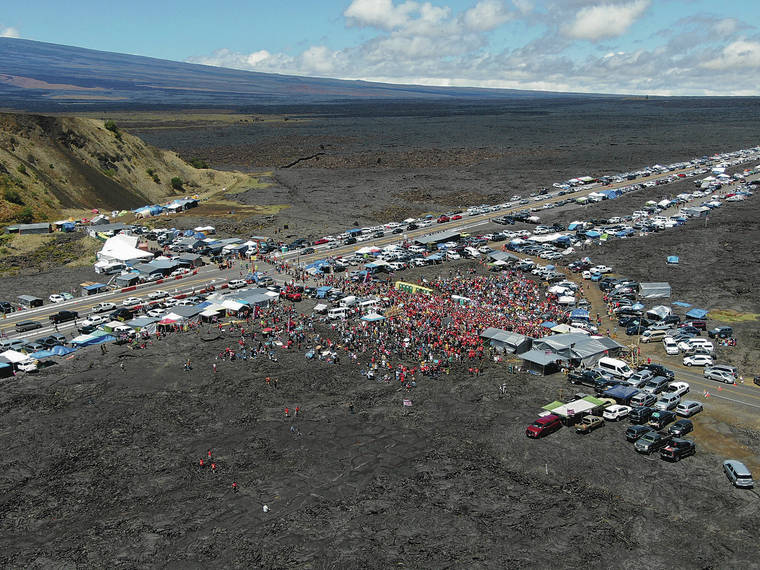Hawaii Sen. Kai Kahele (D, Hilo) questioned whether the state Department of Transportation has legal jurisdiction over Mauna Kea Access Road during a legislative briefing at the state Capitol on Wednesday, setting up what could potentially develop into a larger legal issue for the Thirty Meter Telescope and other telescope sites atop Mauna Kea.
About 50 years ago, the Department of Transportation built Mauna Kea Access Road over
Department of Hawaiian Home Lands property without permission. That road and others throughout the state that were built on DHHL land became part of a much bigger $600 million settlement that the state entered into in 1995 to compensate DHHL for the misuse of Hawaiian home lands. As part of that agreement, known as Act 14, the state was required to compensate DHHL for Mauna Kea Access Road via a land swap.
However, the state never executed a land transfer, DHHL Director William Aila told lawmakers during a legislative briefing called by the Senate Hawaiian Affairs Committee.
The Attorney General’s
office says operational control over the road still resides with the Department of Transportation, even though 24 years later DHHL has yet to be compensated. Aila said Gov. David Ige’s
administration is working
to ensure the land swap is completed.
“The governor has made it a priority,” said Aila.
However, Kahele argued that without a completed land swap, the state had breached the agreement.
“If what you say is true, that the land exchange has never occurred, then without that compliance with Act 14, the state of Hawaii cannot claim title to Mauna Kea Access Road,” said
Kahele to applause from
opponents of the TMT who crowded the hearing room. “That road belongs to the beneficiaries of the Hawaiian Homes Commission Act.”
DHHL still owns the land under the road raising additional questions about the rights of Hawaiian beneficiaries, said Kahele.
“When you have a beneficiary, as defined by the
Hawaiian Homes Commission Act of 1920, sitting on Mauna Kea Access Road, what does not give them the right to be there if they are the beneficiaries of the trust and you just said it is still in your land inventory?” he said.
Aila said he was relying
on the advice of the Attorney General’s office when it comes to jurisdiction.
“I have been advised by the Department of the Attorney General, who also advises you, that the transfer has occurred and therefore DOT has operational control over the road,” Aila said. “So you are entitled to ask the attorney general the same question that we did and see if you can get a different
answer.”
The state closed Mauna Kea Access Road on July 15 to begin transporting equipment up the mountain to the TMT construction site, but opponents of the telescope, known as kia‘i, quickly set up a blockade. State law enforcement officers arrested about three dozen kupuna who were blocking the road on July 17, but have since backed off in what has devolved into a standoff between the state and TMT opponents with no clear path forward for the $1.4 billion telescope project.
Mauna Kea Access Road continues to be blocked by Hawaiians protesting construction of the TMT who have set up tents on the road. The number of demonstrators ebbs and flows and has grown to as many as a few thousand on weekends. The road has become the center of hula and musical performances, and where visitors offer gifts to the kupuna.
Alan Murakami, an attorney and community engagement officer for the Native Hawaiian Legal Corporation, said the lack of a state land swap raises legal questions for TMT.
“If it is true that there has been no confirmation of a land exchange as contemplated under Act 14, then there is no transfer of title and should not be a transfer of title that would justify
the assertion of control
and management over any property that was not properly compensated for,” Murakami told the Star-
Advertiser.
He added that any trustee has a duty to protect trust assets from any loss.






